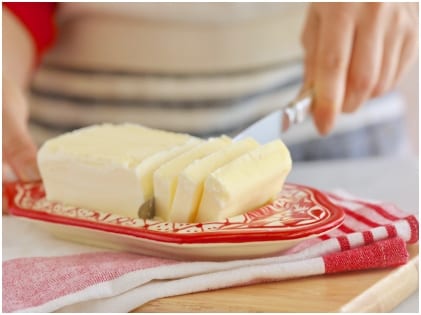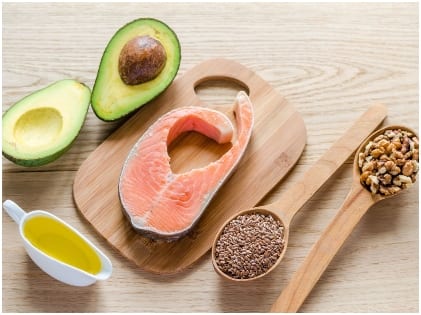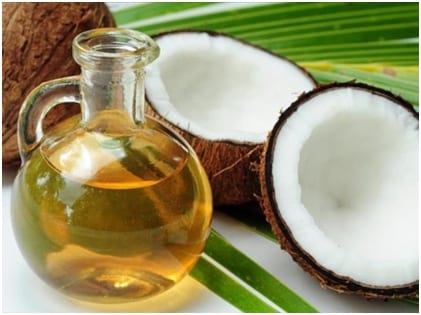
Can You Eat Fat To Beat Fat?

For decades, we are made to believe that the best way of losing fat is to cut down fat from the diet. Nutritionists often advise us to limit our fat intake. However, fats can be broadly categorized into two types – fat that is bad for health such as saturated fats and trans fats and fat that is good for health such as unsaturated fats. Where the former increases LDL cholesterol or triglycerides, the latter lowers LDL and prevents abnormal heartbeats and diseases. Let’s find out whether you can eat fat to beat fat.
Saturated Fats
 Saturated fats or trans fats have one thing in common. Both become solid at room temperature. For example, regular salted butter is nothing else than a marbleized fat in a container. However, bad fats come in liquid form too (for instance, whole milk and coconut oil). Well, these fats generally increase your total cholesterol, further leading to LDL cholesterol, which can cause the formation of blockages in your coronary arteries.
Saturated fats or trans fats have one thing in common. Both become solid at room temperature. For example, regular salted butter is nothing else than a marbleized fat in a container. However, bad fats come in liquid form too (for instance, whole milk and coconut oil). Well, these fats generally increase your total cholesterol, further leading to LDL cholesterol, which can cause the formation of blockages in your coronary arteries.
There are 24 different types of saturated fats, though not all of them are bad for health. These fats are normally found in whole milk, cheese, and several other dairy products, as well as beef. Even a few vegetable oils like palm and coconut oil has saturated fats. Curiously, pure chocolates though contain stearic acid aka saturated fat, are more like an unsaturated fat as it lowers the LDL levels. So, all the chocolate lovers there, fret not. You can continue licking a bar of pure chocolate but in a restricted amount.
Are There Good Fats Too?
 Good fats can be broadly categorized into polyunsaturated fat and monounsaturated fat that mainly comes from fish products and vegetables. Polyunsaturated Fats are necessary for our bodies to function normally. Also, they help to build cell membranes, the sheath around the nerves and the casing of the cell. Similarly, they are equally important to blood clotting, inflammation, and muscle relaxation. They lower LDL and triglycerides, thereby improving our overall cholesterol profile. There are generally two kinds of polyunsaturated fats, which are Omega-3 (n-3) and Omega-6 (n-6).
Good fats can be broadly categorized into polyunsaturated fat and monounsaturated fat that mainly comes from fish products and vegetables. Polyunsaturated Fats are necessary for our bodies to function normally. Also, they help to build cell membranes, the sheath around the nerves and the casing of the cell. Similarly, they are equally important to blood clotting, inflammation, and muscle relaxation. They lower LDL and triglycerides, thereby improving our overall cholesterol profile. There are generally two kinds of polyunsaturated fats, which are Omega-3 (n-3) and Omega-6 (n-6).
Researchers found that omega-3 fatty acids prevent and even can be instrumental in treating heart diseases and autoimmune diseases like eczema, rheumatoid arthritis, and lupus. This fatty acid is generally sourced from fish such as mackerel, sardines, and salmon and walnuts, un-hydrogenated soybean oil, flaxseeds, and canola oil. On the other hand, omega-6s have a greater content of linoleic acid that also works to reduce the risk of heart disease. Omega-6 fatty acids are found in safflower, sunflower, corn oils, walnuts, and soybean.
Eat Fat To Beat Fat: Is It A Gimmick?
 ‘Eat fat to cut the fat’ – this hardly makes any sense, right? It sounds almost absurd when we match it with the old saying – ‘We are what we eat’. However, you can eat fat to beat fat. Here’s how you can do that.
‘Eat fat to cut the fat’ – this hardly makes any sense, right? It sounds almost absurd when we match it with the old saying – ‘We are what we eat’. However, you can eat fat to beat fat. Here’s how you can do that.
Our body secretes hormones based on the food we eat. If you ingest carbs throughout the day, your body will develop a system to burn carbs and store the overage. Likewise, if you eat mostly fat, your body will do the same. However, to eat fat to beat fat, you need to consider MCT (Medium-chain triglycerides), which is found in coconut oil and palm kernel oil.
Even though these carbons are saturated fats, they have a surprising property – they are directly absorbed into the portal vein. When your body can access fat quickly, it becomes capable of burning it quickly as well. As MCT triggers ketone production, it helps to fuel your nervous system’s cell when energy is required from the fat molecules. According to obesity researchers, adding MCT oil in your regular diet can increase fatty acid oxidation, thereby triggering the quick burning of the fat consumed. This way, you can eat fat to ‘burn’ fat.
The key here is to focus more on eating good fats and eliminating bad fats. Avocados, olive oil, nuts, and fish can be consumed as these are sources of good fats. Eggs are a healthier option and an easy source of protein. While many may think that the egg white is more nutritious and not the yolk, this may not be the truth always. The yolk also contains important nutrients too.
More in Nutrition & Weight Loss
-
`
Is Swimming in Cold Water Good for You?
Swimming is a beloved activity that provides numerous physical and mental health benefits. Swimming can be a fantastic workout, whether you’re...
November 15, 2023 -
`
Unlocking the True Benefits of Detox Water
Detox water has taken the health and wellness world by storm, promising a wide range of benefits that go beyond ordinary...
November 7, 2023 -
`
How Tom Brady Shed 10 lbs After Retirement
One of the NFL’s most celebrated athletes, Tom Brady, has always been a topic of discussion. Brady never fails to surprise,...
November 1, 2023 -
`
AI’s Hidden Toll on Our Brains
Artificial Intelligence (AI) has permeated almost every facet of our lives, from virtual assistants and recommendation algorithms to autonomous vehicles and...
October 24, 2023 -
`
What to Drink During a Workout
When it comes to getting the most out of your workout, proper hydration is key. What you drink during exercise can...
October 17, 2023 -
`
Wearable Technology Applications in Healthcare
The world of healthcare is evolving at an unprecedented pace, and wearable technology is one of the driving forces behind this...
October 10, 2023 -
`
Initiating and Integrating Exercise in Daily Life
Incorporating exercise into our daily lives is essential for maintaining optimal health and well-being. However, initiating a fitness routine and seamlessly...
October 10, 2023 -
`
Jason Momoa’s Workout Routine for Iconic Aquaman Look
We all remember the moment: The big screen lights up, waves crash, and out emerges Jason Momoa as Aquaman, with his...
October 8, 2023 -
`
Crying: The Benefits on Mental Health
In a world that often champions stoicism and emotional restraint, shedding tears is sometimes dismissed as a sign of vulnerability. However,...
September 26, 2023















You must be logged in to post a comment Login